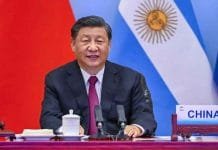Dhaka – Bangladesh’s Chief Advisor of the interim government, Mohammad Yunus, has issued a stark warning over the escalating refugee crisis, declaring that managing more than 1.3 million Rohingya Muslims in Bangladesh has become “increasingly difficult.” He emphasized that this crisis is not just a national burden but a global humanitarian challenge, urging the international community to unite in finding a long-term solution.
Yunus unveiled a seven-point roadmap on Monday, aimed at ensuring the safe repatriation of Rohingyas back to Myanmar. His remarks came as Bangladesh marked another somber chapter in the ongoing refugee crisis, with refugees themselves observing “Rohingya Genocide Memorial Day.”
Bangladesh Under Pressure: The Rohingya Burden
Since 2017, when hundreds of thousands of Rohingya fled from Myanmar’s Rakhine State following widespread violence, Bangladesh has become home to the world’s largest refugee camp in Cox’s Bazar. The country now shelters over 1.3 million Rohingya, a number that continues to strain Bangladesh’s economy, environment, and security infrastructure.
According to Yunus, this vast refugee population has placed unprecedented pressure on limited land resources, health facilities, and local communities. He stressed that while Bangladesh extended shelter on humanitarian grounds, the situation has reached a breaking point, demanding immediate international cooperation.
The Call for International Cooperation
In his address, Yunus appealed to global leaders, humanitarian organizations, and diplomats to take joint responsibility for the crisis. He insisted that the safe and dignified return of Rohingya Muslims to Myanmar is the only sustainable solution.
“Bangladesh cannot carry this burden alone,” Yunus stated, underscoring that the Rohingya crisis has now become a test of global solidarity.
His seven-point roadmap includes:
Intensified diplomatic engagement with Myanmar.
Stronger UN involvement to secure commitments from Naypyidaw.
Regional cooperation involving ASEAN and neighboring states.
Increased humanitarian aid for Bangladesh until repatriation occurs.
Protection of the human rights and dignity of refugees.
Establishment of a clear timeline for safe return.
Ensuring accountability for crimes committed against Rohingyas.
Rohingya Genocide Memorial Day: Voices from the Camps
While Yunus spoke in Dhaka, thousands of Rohingya refugees in Cox’s Bazar marked Rohingya Genocide Memorial Day, commemorating the brutal events of August 25, 2017, when Myanmar’s military crackdown forced more than 700,000 Rohingyas to flee across the border.
Refugees held peaceful demonstrations, carrying placards reading “No more refugee life” and demanding a future of dignity and justice. The event drew participation from international diplomats, human rights activists, and humanitarian groups, highlighting the urgency of the crisis.
One refugee leader stated, “We want justice, we want to return home with dignity. Bangladesh has sheltered us, but we cannot live like this forever.”
The Origins of the Crisis: Mass Migration in 2017
The Rohingya exodus began on August 25, 2017, when Myanmar’s security forces and Arakan Army unleashed a campaign of violence, forcing entire villages to flee. Within weeks, more than 700,000 people crossed into Bangladesh, joining an estimated 300,000 Rohingyas who were already living there from earlier waves of persecution.
Today, their population in Bangladesh exceeds 1.3 million, making Cox’s Bazar the largest refugee settlement on Earth. Refugees live in cramped shelters, heavily dependent on international aid, with limited opportunities for education, work, or mobility.
The Economic and Environmental Strain on Bangladesh
Hosting such a massive displaced population has caused significant socio-economic challenges for Bangladesh:
Economic Costs: Billions of dollars have been spent on food, shelter, and healthcare, with donor fatigue becoming a major obstacle.
Environmental Degradation: Large areas of forest in Cox’s Bazar have been destroyed to accommodate the refugee camps, leading to soil erosion, flooding, and loss of biodiversity.
Social Tensions: Local communities often compete with refugees for scarce resources, creating tension and sporadic clashes.
Security Concerns: Refugee camps have occasionally witnessed rising criminal activities, drug trafficking, and fears of militant infiltration.
Despite these hurdles, Bangladesh has not forced mass deportations and continues to advocate for a peaceful resolution through diplomacy.
Global Response and the Need for Action
While international organizations such as the United Nations High Commissioner for Refugees (UNHCR) and World Food Programme (WFP) provide critical support, funding gaps remain. Appeals for billions in aid have only been partially met, leaving shortages in food, education, and healthcare services.
Human rights groups stress that the root of the crisis lies in Myanmar, where Rohingya continue to face statelessness, discrimination, and violence. Without reforms in Myanmar, safe repatriation will remain elusive.
Global powers, including the United States, European Union, and ASEAN nations, have repeatedly condemned Myanmar’s actions, but concrete progress toward accountability and safe return remains limited.
Mohammad Yunus’s Leadership in a Volatile Time
As the interim Chief Advisor, Mohammad Yunus is attempting to balance domestic stability with international diplomacy. His leadership reflects a growing urgency to find a sustainable path forward before the situation worsens.
By releasing a structured roadmap, Yunus has placed the responsibility on the global community to share the burden. His call highlights that this is not merely a Bangladeshi issue, but a crisis that will continue to affect regional security, migration patterns, and international human rights standards.
What Lies Ahead for the Rohingya?
The road to a solution remains fraught with challenges:
Myanmar’s political instability continues to block safe repatriation.
International funding for refugees is shrinking.
Host communities in Bangladesh are growing increasingly frustrated.
Refugees themselves are demanding justice, recognition, and return.
Without coordinated global action, the Rohingya crisis risks becoming a protracted humanitarian emergency, similar to other long-standing refugee situations worldwide.
Conclusion: A Global Test of Humanity
The plight of the Rohingya people is more than a Bangladeshi concern—it is a test of the world’s conscience. As Mohammad Yunus warned, handling such a massive displaced population is now beyond the capacity of one nation. His seven-point roadmap is not only a plea for help but a reminder that global solidarity is the only path forward.
As refugees in Cox’s Bazar declare, “No more refugee life,” the question remains: Will the world answer their call?















[…] Visit Source […]